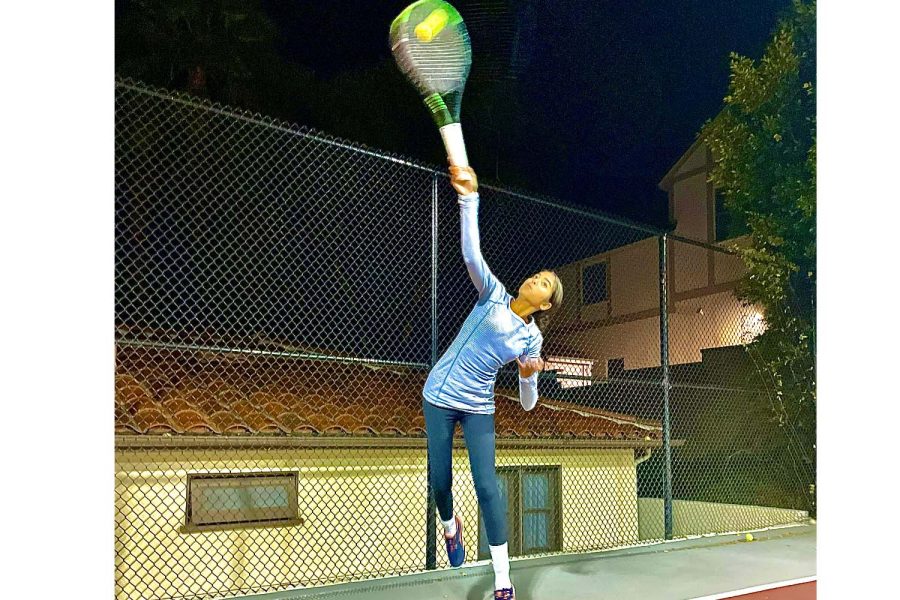Op-Ed: What off-season?
Photo credit: Chirag Patil
This picture shows me serving at 9 p.m. on a Tuesday night. I try to come out and take a basket of serves daily in order to better my serve speed, technique and spin. I do this because I want my serve to be stronger, so people have a hard time returning my serve, giving me an edge over them during my service games.
February 5, 2022
Lengthy, arduous practices four days a week. The daily alternation between endurance runs, strength training, HIIT workouts, weighted cardio and Peloton bike rides. Two-day long tournaments every other weekend. This is what my tennis “off-season” looks like.
The truth is, there is no off-season. There are no rest days. There is only waking up, unable to move from overworked muscles, and falling asleep right as my head hits the pillow after a physically draining day.
I am exhausted. We are exhausted.
The off-season is known to outsiders as a time for athletes to recuperate from their strenuous seasons. However, athletes know that the opposite is true. The off-season is a time where the pressure to elevate our games comes in from all directions, where the constant yelling from our coaches during practice, and our own internal frustration, causes a diminishment of self-confidence in our abilities.
For years, there has been an ongoing conversation about how student-athletes struggle to balance all aspects of our hectic lives, like academics and sports during our seasons. However, there is barely any discussion on why rates of mental health issues, specifically depression and anxiety, are so high in athletes out of season.
The Journal of Behavioral and Brain Science states perceived stress, an individual’s gage of their stress level, is higher out of season than in-season, due to the off-season’s lack of structural organization. As a tennis player in my off-season, I can personally attest to this.
In season, the set schedule of games and practices each week makes me feel on track, and I am constantly improving and learning. Games give athletes the ability to visually see their progress through performance in tournaments and definite scores.
When there is no specific goal in mind or school scrimmages to perform for, athletes feel like they are not improving quickly enough. The pressure to improve performance can come from coaches, family, friends, teammates and more than not, the athletes themselves. This buildup of pressure and stress can lead an athlete to feel discouraged, leaving them questioning their abilities.
Loss of self-confidence derived from the off-season can translate beyond doubt in my athletic ability. It causes the spread of reduced self-esteem in all aspects of my life. I know I am not alone in this experience.
If you ask any student-athlete what their advice is for improving one’s game, their response and mine will most likely be something along the lines of “Train harder.” Overtraining is a common phenomenon within the off-season, stemming from both athletes’ constant feeling of not performing well enough, and outside pressure to improve. There is a proven link between overtraining and the increasing rates of mental health illnesses. But athletes tend not to seek help for their disorders due to stigma surrounding mental health issues in athletes, and instead can turn to unhealthy coping mechanisms such as underage alcohol abuse.
Loneliness is another contributing factor to athletes’ mental health issues in the off-season. The physical presence of a team is lost during the off-season. The lack of the ability to directly see the similarities between themselves and others in their similar situation, causes athletes to feel isolated and alone in their experiences.
Changing the athlete mentality that is hardwired into our brains during the off-season is challenging. Alleviating a majority of pressure coming from other people and the stigma around mental health issues in athletes would help resolve a fraction of a much bigger issue.
All of the hard work that athletes put in out-of-season and the effects they face support one idea: the off-season poses challenges to athletes that go beyond what originally meets the eye. These very real struggles need to be publicly recognized and given the attention they deserve.
The way the off-season is approached by coaches and athletes needs to change, and for all of our sanities, it needs to change now.










Allie Yang • Mar 9, 2022 at 9:53 pm
As someone who is not an athlete, I had no prior knowledge about the complexity of off-season. Thank you for bringing this issue to light, Surya!
Tiffany Smith-Anoa'i • Feb 10, 2022 at 4:20 pm
As the mother of a student-athlete, I can attest there is no “off season!”
I truly wish there was more time and the grind wasn’t, well, the grind…
Great reporting Surya!